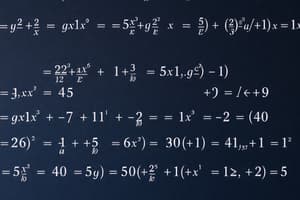Podcast
Questions and Answers
Which of the following equations is a quadratic equation?
Which of the following equations is a quadratic equation?
- $(x - 2)(x + 1) = (x - 1)(x + 3)$
- $(x + 1)^3 = x^3 + 7$
- $(x - 3)(2x + 1) = x(x + 5)$ (correct)
- $(x + 2)^2 = 2x(x^2 - 1)$
The equation $(x + 2)^2 = 2x(x^2 - 1)$ is a quadratic equation.
The equation $(x + 2)^2 = 2x(x^2 - 1)$ is a quadratic equation.
False (B)
If the area of a rectangular plot is 528 $m^2$ and the length is one more than twice its breadth, express this situation as a quadratic equation in terms of the breadth $x$.
If the area of a rectangular plot is 528 $m^2$ and the length is one more than twice its breadth, express this situation as a quadratic equation in terms of the breadth $x$.
$2x^2 + x - 528 = 0$
The product of two consecutive positive integers is 306. Which quadratic equation represents this situation, where $x$ is the smaller integer?
The product of two consecutive positive integers is 306. Which quadratic equation represents this situation, where $x$ is the smaller integer?
If Rohan's mother is 26 years older than him, and the product of their ages 3 years from now will be 360, the quadratic equation representing Rohan's present age, $x$, is $x^2 + ______x - 273 = 0$.
If Rohan's mother is 26 years older than him, and the product of their ages 3 years from now will be 360, the quadratic equation representing Rohan's present age, $x$, is $x^2 + ______x - 273 = 0$.
A train travels 480 km at a uniform speed. If the speed had been 8 km/h less, it would have taken 3 hours more to cover the same distance. Which quadratic equation can be used to find the speed of the train ($x$)?
A train travels 480 km at a uniform speed. If the speed had been 8 km/h less, it would have taken 3 hours more to cover the same distance. Which quadratic equation can be used to find the speed of the train ($x$)?
The roots of the quadratic equation $x^2 - 3x - 10 = 0$ are $x = 5$ and $x = -2$.
The roots of the quadratic equation $x^2 - 3x - 10 = 0$ are $x = 5$ and $x = -2$.
Determine the roots of the quadratic equation $2x^2 + x - 6 = 0$.
Determine the roots of the quadratic equation $2x^2 + x - 6 = 0$.
What are the roots of the quadratic equation $\sqrt{2}x^2 + 7x + 5\sqrt{2} = 0$?
What are the roots of the quadratic equation $\sqrt{2}x^2 + 7x + 5\sqrt{2} = 0$?
The quadratic equation $100x^2 - 20x + 1 = 0$ has a repeated root. The value of this root is ______.
The quadratic equation $100x^2 - 20x + 1 = 0$ has a repeated root. The value of this root is ______.
If John and Jivanti together have 45 marbles, and after losing 5 marbles each, the product of the number of marbles they have is 124. It's possible that John initially had 36 marbles.
If John and Jivanti together have 45 marbles, and after losing 5 marbles each, the product of the number of marbles they have is 124. It's possible that John initially had 36 marbles.
A cottage industry produces a certain number of toys in a day. The cost of production of each toy (in rupees) is 55 minus the number of toys produced. If the total cost of production is $\text{Rs }750$, find the possible number of toys produced that day.
A cottage industry produces a certain number of toys in a day. The cost of production of each toy (in rupees) is 55 minus the number of toys produced. If the total cost of production is $\text{Rs }750$, find the possible number of toys produced that day.
Which of the following sequences is an Arithmetic Progression (AP)?
Which of the following sequences is an Arithmetic Progression (AP)?
Given the arithmetic progression (AP) 3, $3 + \sqrt{2}$, $3 + 2\sqrt{2}$, $3 + 3\sqrt{2}$ ..., the common difference is ______.
Given the arithmetic progression (AP) 3, $3 + \sqrt{2}$, $3 + 2\sqrt{2}$, $3 + 3\sqrt{2}$ ..., the common difference is ______.
It is possible to have 1, $a$, $a^2$, $a^3$, ... as an example of an arithmetic progression.
It is possible to have 1, $a$, $a^2$, $a^3$, ... as an example of an arithmetic progression.
Find two numbers whose sum is 27 and product is 182.
Find two numbers whose sum is 27 and product is 182.
What are two consecutive positive integers, the sum of whose squares is 365?
What are two consecutive positive integers, the sum of whose squares is 365?
The altitude of a right triangle is 7 cm less than its base. If the hypotenuse is 13 cm, then the length of the base of the triangle is ______ cm.
The altitude of a right triangle is 7 cm less than its base. If the hypotenuse is 13 cm, then the length of the base of the triangle is ______ cm.
A cottage industry produces pottery articles. The cost of production of each article in rupees is 3 more than twice the number of articles produced. If the total cost is Rs. 90, then it not possible for 5 article to be produced.
A cottage industry produces pottery articles. The cost of production of each article in rupees is 3 more than twice the number of articles produced. If the total cost is Rs. 90, then it not possible for 5 article to be produced.
Find the roots of equation, $2x^2 - 7x + 3 = 0$, using the quadratic formula.
Find the roots of equation, $2x^2 - 7x + 3 = 0$, using the quadratic formula.
Determine the sum of the roots of quadratic equation, $2x^2 + x - 4 = 0$.
Determine the sum of the roots of quadratic equation, $2x^2 + x - 4 = 0$.
For quadratic equation, $4x^2 + 4\sqrt{3}x + 3 = 0$, the value of x is ______.
For quadratic equation, $4x^2 + 4\sqrt{3}x + 3 = 0$, the value of x is ______.
For a quadratic equation, $2x^2 + x + 4 = 0$, it is possible to find the real roots.
For a quadratic equation, $2x^2 + x + 4 = 0$, it is possible to find the real roots.
Find the roots of the equation given, $x - \frac{1}{x} = 3, x \neq 0$.
Find the roots of the equation given, $x - \frac{1}{x} = 3, x \neq 0$.
Find the solution of $\frac{1}{x + 4} - \frac{1}{x - 7} = \frac{11}{30}$, given $x \neq -4, 7$.
Find the solution of $\frac{1}{x + 4} - \frac{1}{x - 7} = \frac{11}{30}$, given $x \neq -4, 7$.
The sum of the reciprocals of Rehman's ages (in years) 3 years ago and 5 years from now is $\frac{1}{3}$. Therefore, Rehman's present age is ______ years.
The sum of the reciprocals of Rehman's ages (in years) 3 years ago and 5 years from now is $\frac{1}{3}$. Therefore, Rehman's present age is ______ years.
In a class test, Shefali's marks in Mathematics and English sum to 30. If she had 2 more in Maths and 3 less in English, the product would be 210. Then this is a impossible situation.
In a class test, Shefali's marks in Mathematics and English sum to 30. If she had 2 more in Maths and 3 less in English, the product would be 210. Then this is a impossible situation.
If the diagonal of a rectangular field is 60 meters more than the shorter side and the longer side is 30 meters more than the shorter side, then what is the length of the shortest side of the field??
If the diagonal of a rectangular field is 60 meters more than the shorter side and the longer side is 30 meters more than the shorter side, then what is the length of the shortest side of the field??
The difference of the squares of two numbers is 180. The square of the smaller number is 8 times the larger number. What is the value of the larger number?
The difference of the squares of two numbers is 180. The square of the smaller number is 8 times the larger number. What is the value of the larger number?
A train travels 360 kilometers at a uniform speed. If the speed has been increased by 5 km / hour, it would have taken 1 hour less. What is the speed of the train?
A train travels 360 kilometers at a uniform speed. If the speed has been increased by 5 km / hour, it would have taken 1 hour less. What is the speed of the train?
Two water taps can fill a tank in $9 \frac{3}{8}$ hours. The larger diameter tap takes 10 hours less than the smaller one. The time for only the smaller type to fill is approximately ______ hours
Two water taps can fill a tank in $9 \frac{3}{8}$ hours. The larger diameter tap takes 10 hours less than the smaller one. The time for only the smaller type to fill is approximately ______ hours
An express train takes 1 hour less than the first train 132 km between 2 cities.If the average speed of express and regular train is 11km/hr, then 40 km/hour is possible travel speed for a train in this situation.
An express train takes 1 hour less than the first train 132 km between 2 cities.If the average speed of express and regular train is 11km/hr, then 40 km/hour is possible travel speed for a train in this situation.
The sum of the areas of two squares is 468 $m^2$. If the difference of perimeters is 24 m, what are the sides of the squares?
The sum of the areas of two squares is 468 $m^2$. If the difference of perimeters is 24 m, what are the sides of the squares?
For the equation $2x^2 + kx + 3 = 0$, what is (are) value(s) of k does it have two equal roots?
For the equation $2x^2 + kx + 3 = 0$, what is (are) value(s) of k does it have two equal roots?
For the quadratic equation $kx (x – 2) + 6 = 0$, the value of $k$ for has equal roots is ______
For the quadratic equation $kx (x – 2) + 6 = 0$, the value of $k$ for has equal roots is ______
It is possible to a rectangular mango grove whose length is twice its breadth, and the area is 800 $m^2$.
It is possible to a rectangular mango grove whose length is twice its breadth, and the area is 800 $m^2$.
What are the length and breadth of possible rectangular mango grove is the length is twice its breadth and the area is 800 $m^2$?
What are the length and breadth of possible rectangular mango grove is the length is twice its breadth and the area is 800 $m^2$?
The sum of the ages of two friends is 20 years. Four years ago, the product of their ages was 48. Is this situation possible??
The sum of the ages of two friends is 20 years. Four years ago, the product of their ages was 48. Is this situation possible??
Is it possible to design a rectangular park of perimeter 80 meters and area 400 $m^2$? Then the lengths would be equal to ______ or less.
Is it possible to design a rectangular park of perimeter 80 meters and area 400 $m^2$? Then the lengths would be equal to ______ or less.
Flashcards
Quadratic Equation
Quadratic Equation
An equation of the form ax² + bx + c = 0, where a ≠ 0.
Completing the Square
Completing the Square
Method to solve quadratic equations by expressing one side as a squared expression.
Discriminant
Discriminant
The value inside the square root in the quadratic formula (b² - 4ac), determining the nature of the roots.
Roots of a Quadratic Equation
Roots of a Quadratic Equation
Signup and view all the flashcards
Quadratic Formula
Quadratic Formula
Signup and view all the flashcards
Two Distinct Real Roots
Two Distinct Real Roots
Signup and view all the flashcards
Two Equal Real Roots
Two Equal Real Roots
Signup and view all the flashcards
No Real Roots
No Real Roots
Signup and view all the flashcards
Arithmetic Progression (AP)
Arithmetic Progression (AP)
Signup and view all the flashcards
Common Difference
Common Difference
Signup and view all the flashcards
Formula for Common Difference
Formula for Common Difference
Signup and view all the flashcards
General Term of an AP
General Term of an AP
Signup and view all the flashcards
Factorisation
Factorisation
Signup and view all the flashcards
Study Notes
Checking for Quadratic Equations
- Check if an equation is quadratic by verifying if it can be written in the form ax² + bx + c = 0, where a ≠ 0.
- Simplify and rearrange terms to compare against the standard quadratic form.
Solving Quadratic Equations by Factorisation
- Factorise/factorize the quadratic equation into two linear factors.
- Set each factor equal to zero and solve for x to find the roots.
- The roots represent the values for x that make the equation true.
Representing Situations as Quadratic Equations
- Define variables to represent unknown quantities in the problem.
- Translate word problems into algebraic expressions, forming a quadratic equation.
- Use information given to create the relationships or an equate to zero.
Finding Roots Using Factorisation/Factorization:
- Express the quadratic equation in the standard form ax² + bx + c = 0.
- Factorise/factorize the expression into a product of two binomial expressions.
- Equate each factor to zero to find the values of x, which constitute the roots.
Solving Word Problems with Quadratic Equations
- Define variables for the unknown quantities.
- Formulate a quadratic equation based on the relationships described in the problem.
- Solve the quadratic equation to find possible solutions.
- Check solutions against the original problem to discard any that don't make sense in context
Arithmetic Progressions (APs)
- An AP is a sequence where the difference between consecutive terms is constant, which is called the common difference, denoted by 'd'.
- To check if a sequence is an AP, verify that ak+1 - ak is consistent/constant for all consecutive terms.
- Three more terms or subsequent terms can be found by adding 'd' to the last known term.
Determining if a Sequence is an AP
- Calculate the difference d = a₂ - a₁ between the first two terms.
- Verify that the difference between any two successive terms in the sequence is consistently equal to d.
- If the difference is not the same every time, the numbers are not forming an AP.
- If it is the same, three more terms are a₅ = a₄ + d, a₆ = a₅ + d and a₇ = a₆ + d
Solving Problems Involving the Sum and Product of Two Numbers
- Express the sum and the product of two numbers as equations.
- Solve the system of equations to find the numbers.
- Construct a quadratic equation based on the given conditions. Find the two numbers.
Applying the Pythagorean Theorem
- Relate the sides of a right triangle using a quadratic equation based on the theorem: Base² + Altitude² = Hypotenuse².
- Solve the equation to determine the length of the sides.
Solving Production-Related Problems
- Let the number of articles produced be the variable x.
- Form an equation for the cost of production based on the scenario.
- Solve the equation and interpret the results to find the number of products and costs
Solving Quadratic Equations by Completing the Square
- Transform the quadratic equation into the form (x + a)² = b.
- Take the square root of both sides of the equation
- Solve for 'x' to obtain the roots of the equation.
Applying the Quadratic Formula
- The quadratic formula is used to find the roots of the general quadratic equation expressed as ax² + bx + c = 0
- The quadratic formula is expressed as x=(-b±√(b^2-4ac))/2a
Determining Nature of Roots Using Discriminant
- The discriminant(D) is given as b² - 4ac
- If D > 0, the equation has two distinct real roots.
- If D = 0, the equation has two equal real roots.
- If D < 0, the equation has no real roots
Finding Values for Equal Roots
- For a quadratic equation ax² + bx + c = 0 to gave two equal roots, the Discriminant (D = b²-4ac) will be 0.
- Substitute in values for a, b and c and simplify
Solving Design Problems Using Quadratic Equations
- Define constraints and relationships for designing a geometric structure, e.g. a rectangular mango groove, with characteristics, length, twice it's breath.
- Express these constraints as a single quadratic equation.
Determining the Feasibility of a Given Situation
- Define the conditions of the problem as algebraic variables and relationships.
- Establish an equation to check against established principles.
- Examine discriminants and or validity to discover the possibility of a situation.
Studying That Suits You
Use AI to generate personalized quizzes and flashcards to suit your learning preferences.




